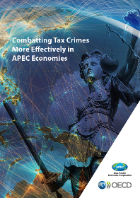Tax and crime
Tax and crime: Publications and reports
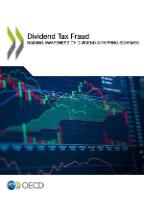 |
Dividend Tax Fraud: Raising Awareness of Dividend Stripping Schemes
Published 7 December 2023 Dividend stripping is a type of fraud that is committed through a complex mechanism of trading, selling and repurchasing shares over a certain period to unlawfully avoid payment of dividend taxes, or to claim unjustified tax reimbursements. Dividend stripping in its many forms poses a great challenge to the tax bases of numerous jurisdictions and may create market distortions that corrode the integrity of the financial system. This report is intended to raise awareness of dividend stripping frauds and provides a number of recommendations for countries around recognising the risk, improving domestic co-ordination and expanding international co-operation. In particular, tackling dividend stripping requires strong domestic inter-agency co-ordination and international co-operation, as well as the sharing of information between jurisdictions. Countries may therefore wish to prepare targeted actions and comprehensive strategies against this phenomenon, including not only tax administrations and law enforcement, but also financial regulators and supervisory authorities, as well as anti-money laundering competent authorities. Legislative changes may also be required in some cases. |
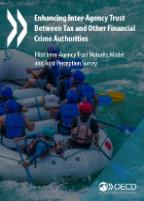 |
Published 7 December 2023 This report includes two new pilot tools for enhancing inter-agency trust and whole of government approaches. These are the Inter-Agency Trust Maturity Model, which is a tool for jurisdictions to self-assess the level of maturity of their practices and processes for achieving and maintaining inter-agency trust, and the Inter-Agency Trust Perception Survey, that is intended to help tax and other financial crime authorities understand how they perceive each other and whether they need to work further to improve perceptions and trust. |
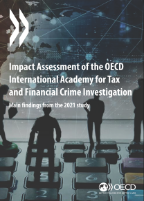 |
Published 22 September 2022 The OECD International Academy for Tax and Financial Crime Investigation was established in 2013 with the objective of strengthening the capacity of developing countries to combat illicit financial flows by providing demand-driven training to law enforcement authorities on the practical skills required to detect and combat tax crimes and other financial crimes. To assess whether the Academy is meeting this objective, the OECD completed an evaluation and impact assessment in 2021 designed to gauge its impact at the individual, organisational, and jurisdictional levels. |
 |
Assessing Tax Compliance and Illicit Financial Flows in South Africa Published 25 April 2022 Tax-related illicit financial flows (IFFs) such as tax evasion are a major policy challenge for developing and emerging economies, in particular as the COVID-19 pandemic has drained domestic resources. This report presents results from a joint project between the OECD and the National Treasury of South Africa, which assesses tax compliance and tax-related IFFs in South Africa. |
 |
Fighting Tax Crime – The Ten Global Principles, Second Edition Published 17 June 2021 This guidance document is designed to support jurisdictions in their implementation of the OECD’s 2022 Recommendation of the Council on the Ten Global Principles for Fighting Tax Crime – the first comprehensive global standard on combatting tax crimes. The guide provides jurisdictions with complementary information on the ten essential legal, institutional, administrative, and operational frameworks necessary combat tax crimes. First published as a reference guide in 2017, this updated edition addresses new challenges such as tackling professionals who enable tax and white-collar crimes, and includes a compendium of “country chapters” which benchmark the domestic tax crime frameworks of 33 jurisdictions. |
 |
Ending the Shell Game: Cracking down on the Professionals who enable Tax and White Collar Crimes Published 25 February 2021 This report sets out a range of strategies and actions for countries to take to tackle professional intermediaries who enable tax evasion and other financial crimes on behalf of their criminal clients. The report highlights the damaging role played by these intermediaries and the importance of concerted domestic and international action in clamping down on the enablers of crime, and includes recommended counter-strategies for deterring, disrupting, investigating and prosecuting the professionals who enable tax and white collar crimes. |
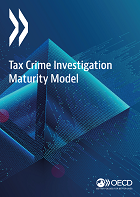 |
Tax Crime Investigation Maturity Model Published 30 November 2020 The Tax Crime Investigation Maturity Model aims to help jurisdictions understand where they stand in the implementation of the OECD's Fighting Tax Crime: The Ten Global Principles, based on a set of empirically observed indicators. By setting out indicators for each increasing level of maturity, the model also charts out an evolutionary path for future progress towards the most cutting-edge practices in tax crime investigation across four levels of maturity: Emerging, Progressing, Established and Aspirational. |
|
Combatting Tax Crimes More Effectively in APEC Economies Published 14 October 2019 Tax evasion and related financial crime threaten the strategic, political, and economic interests of all countries. Recognising the threat that such illicit financial flows pose to the Asia-Pacific region, APEC Finance Ministers developed the Cebu Action Plan, a roadmap for a more sustainable financial future, calling on all APEC Economies to build their capacity to address financial crimes. To support these efforts, the OECD has developed this report which describes the range of OECD legal instruments, policy tools, and capacity building initiatives available to enhance the fight against tax crime in the Asia-Pacific region, drawing on examples and successful practices in APEC Economies. |
|
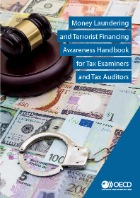 |
Money Laundering and Terrorist Financing Awareness Handbook for Tax Examiners and Tax Auditors Published 13 June 2019 Financial crimes, including tax evasion, money laundering, and terrorist financing undermine jurisdictions' political and economic interests and pose a serious threat to national security. Tax crime is a key source of dirty money and as such, tax authorities have a central role to play in identifying and reporting money laundering and terrorist financing. The purpose of this handbook is to raise the awareness level of tax examiners, auditors, and investigators, of their role in combatting these illegal activities. |
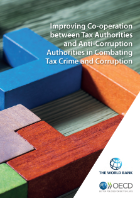 |
Published 22 October 2018 Drawing on the experiences of 67 countries, this study focuses on the legal, strategic, operational, and cultural aspects of co-operation between tax authorities and anti-corruption authorities. The report will enable countries to review and evaluate their own approaches for co-operation on matters relating to tax and corruption, and identify opportunities for improvements based on practices that have proved successful elsewhere. The report was prepared jointly by the OECD and World Bank and will be used to support ongoing capacity building work carried out by both organisations. |
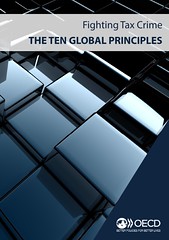
|
Fighting Tax Crime: The Ten Global Principles Published 8 November 2017 This report sets out the 10 essential principles for effectively fighting tax crimes. It covers the legal, institutional, administrative, and operational aspects necessary for putting in place an efficient system for fighting tax crimes and other financial crimes. It draws on the insights and experience of jurisdictions around the world. The purpose is to allow jurisdictions to benchmark their legal and operational framework, and identify areas where improvements can be made. Future work in this area will include adding country specific details, covering a wide range of countries. |
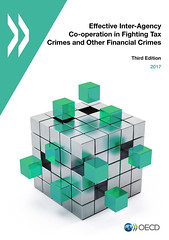
|
Published 8 November 2017 Financial crimes are increasingly sophisticated, with criminals accumulating significant sums through offences such as drug trafficking, fraud, extortion, corruption and tax evasion. Different government agencies may be involved in detecting, investigating and prosecuting these offences and recovering the proceeds of crime, or may hold information essential to these activities. This report describes the current position in 51 countries as to the law and practice for domestic inter-agency co-operation in fighting tax crimes and other financial crimes including, for the first time, co-operation with authorities responsible for the investigation and prosecution of corruption. It identifies successful practices based on countries' experiences of inter-agency co-operation in practice and makes recommendations for how co-operation may be improved. |

|
Shining Light on the Shadow Economy: Opportunities and threats Published 29 September 2017 This report looks at the impact on the shadow economy of changes in ways of working and business models, the growth of the digital economy and the emergence of new technologies. While these are causing some new shadow economy activities to emerge and some existing ones to expand in scale or scope, they are also providing tax administrations with new opportunities and tools to enhance compliance. The report sets out a number of examples of effective actions being taken by tax administrations utilising technology, behavioural insights and new sources of data. It also recommends a number of areas for further targeted work to help improve tax administrations' ability to tackle shadow economy activity, including for collaborative work on the sharing and gig economy. The report is a complementary report to Technology Tools to Tackle Tax Evasion and Tax Fraud. |
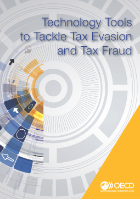 |
Technology Tools to Tackle Tax Evasion and Tax Fraud Published 31 March 2017 This report provides an overview of some of the technology tools that tax authorities have implemented to address tax evasion and tax fraud, focussing on electronic sales suppression and false invoicing. The report also includes a more technical catalogue of these technology solutions, with a view to encouraging other tax authorities that are facing the same types of risks to draw on that experience. The report also discusses complementary work that tax authorities are undertaking to address the cash economy and sharing economy, which, although not types of tax evasion and fraud themselves, can facilitate it.
|
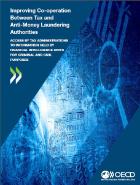 |
Published 18 September 2015 This report uses survey data to analyse the levels of co-operation between the authorities combatting serious financial crimes such as tax crimes, bribery corruption, money laundering and terrorism financing. More specifically, it assesses various models for the sharing of Suspicious Transaction Reports by the Financial Intelligence Unit with the tax administration, both for criminal and civil purposes. It finds that there are significant potential benefits from greater cooperation, with each authority pooling their knowledge and skills. The report subsequently recommends that subject to the necessary safeguards, tax administrations should have the fullest possible access to the STRs received by the FIU in their jurisdiction. |
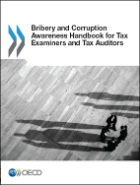 |
Bribery and Corruption Awareness Handbook for Tax Examiners and Tax Auditors Published 7 November 2013 The purpose of this handbook is to raise the awareness of tax examiners and auditors of issues concerning bribery and other forms of corruption and provide guidance on how to recognize indicators of possible bribery or corruption in the course of regular tax examinations and audits.
|
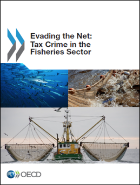 |
Evading the Net: Tax Crime in the Fisheries Sector Published 7 November 2013 This report looks at the issue of tax crime in the fisheries sector, including frauds over taxes on profit and earnings, customs duties, VAT and social security, with examples from real cases. These include crimes that rely on features characteristic of the fisheries sector, as well as those seen in other industries. The report discusses aspects of the sector that make it vulnerable to tax crime, including a lack of transparency and difficulty in obtaining beneficial ownership information resulting from the use of offshore companies and the practice of registering vessels under flags of convenience. Strategies used by tax administrations and other authorities to prevent, detect and investigate tax offences are outlined and the report makes recommendations for steps countries can take, alone or in co-operation, to combat these crimes. |
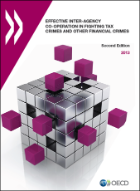 |
Effective Inter-Agency Co-Operation in Fighting Tax Crimes and Other Financial Crimes Published 7 November 2013 This second edition of Effective Inter-Agency Co-operation in Fighting Tax Crimes and Other Financial Crimes describes the current position in 48 countries with respect to the law and practice of domestic inter-agency co-operation in fighting tax crimes and other financial crimes. It outlines the roles of agencies in different countries, legal gateways to enable these agencies to share information and other models for co-operation, such as joint investigations and the establishment of intelligence centres including officials from different authorities. |
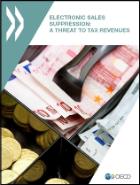 |
Electronic Sales Suppression: A threat to tax revenues Published 18 February 2013
This report describes the functions of point of sales systems and the specific areas of risk to tax administrations. It sets out in detail the electronic sales suppression techniques that have been uncovered and shows how such methods can be detected by tax auditors and investigators. The report also considers a number of strategies adopted in different countries to tackle electronic sales suppression and highlights best practices. In particular, it makes a number of recommendations to countries for addressing this important area of risk. |
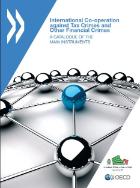 |
Published 14 June 2012
This report aims at improving the understanding and use of international co-operation mechanisms. After describing the different agencies involved in the fight against financial crimes, the report provides an overview of the international instruments available and summarises current initiatives to improve inter-agency co-operation. The core of the report is a catalogue describing the basic features of the main instruments for international co-operation in combating financial crimes. |
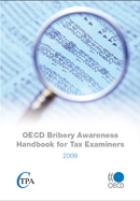 |
Bribery and corruption awareness handbook for tax examiners and tax auditors Published 9 December 2009
The OECD has designed a handbook to provide tax examiners with information on the various bribery techniques used and the tools to detect and identify bribes. The OECD Bribery Awareness Handbook for Tax Examiners is now available in 18 languages. |
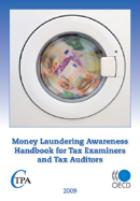 |
Money Laundering and Terrorist Financing Awareness Handbook for Tax Examiners and Tax Auditors Published 8 October 2009
This handbook provides guidance in identifying money laundering during the conduct of normal tax audits, and describes the nature of money laundering activities so that tax examiners and auditors can better understand how their contribution can assist criminal investigators in countering money laundering. |
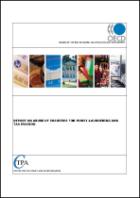 |
Report on Abuse of Charities for Money-Laundering and Tax Evasion Published 24 February 2009 The report summarises the status attached to charities in 19 countries surveyed and compiles the common methods of the abuse of charities and the sectors at risk. It sets out the detection strategies that countries have adopted. It also provides the red flag indicators that will help tax staff in processing tax returns and carrying out audits. The report gives examples of information resources and describes the detection and investigation approaches adopted by a number of the countries. |
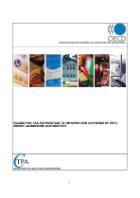 |
Report on Access for Tax Authorities to Information gathered by Anti-Money Laundering Authorities Published September 2007
The OECD has surveyed 30 countries, examining where the responsibility for anti-money laundering programmes was placed, the types of information gathered by or available to, anti-money laundering authorities and confidentiality requirements. The original survey was published in 2002 and this update reports the position as at September 2007. |
| | Report on Tax Fraud and Money Laundering Vulnerabilities involving the Real Estate Sector Published 2007
This report contains information on the tax evasion and money laundering vulnerabilities associated with the real estate sector. The information contained in the report was provided by 18 countries represented in the Sub-Group in response to a questionnaire that was sent to delegates in July 2006. |
 |
Report on Identity Fraud: Tax Evasion and Money Laundering Vulnerabilities Published 2006
The report compiles the common methods of identity fraud encountered and the sectors at risk. It sets out the detection strategies that countries have adopted and importantly provides a listing of red flag indicators which countries can use in training tax auditors. It also includes illustrative case studies to aid comprehension and give practical guidance to tax authorities that are seeking to implement or refine their strategies to effectively address the risks of identity fraud. |
Related Documents
